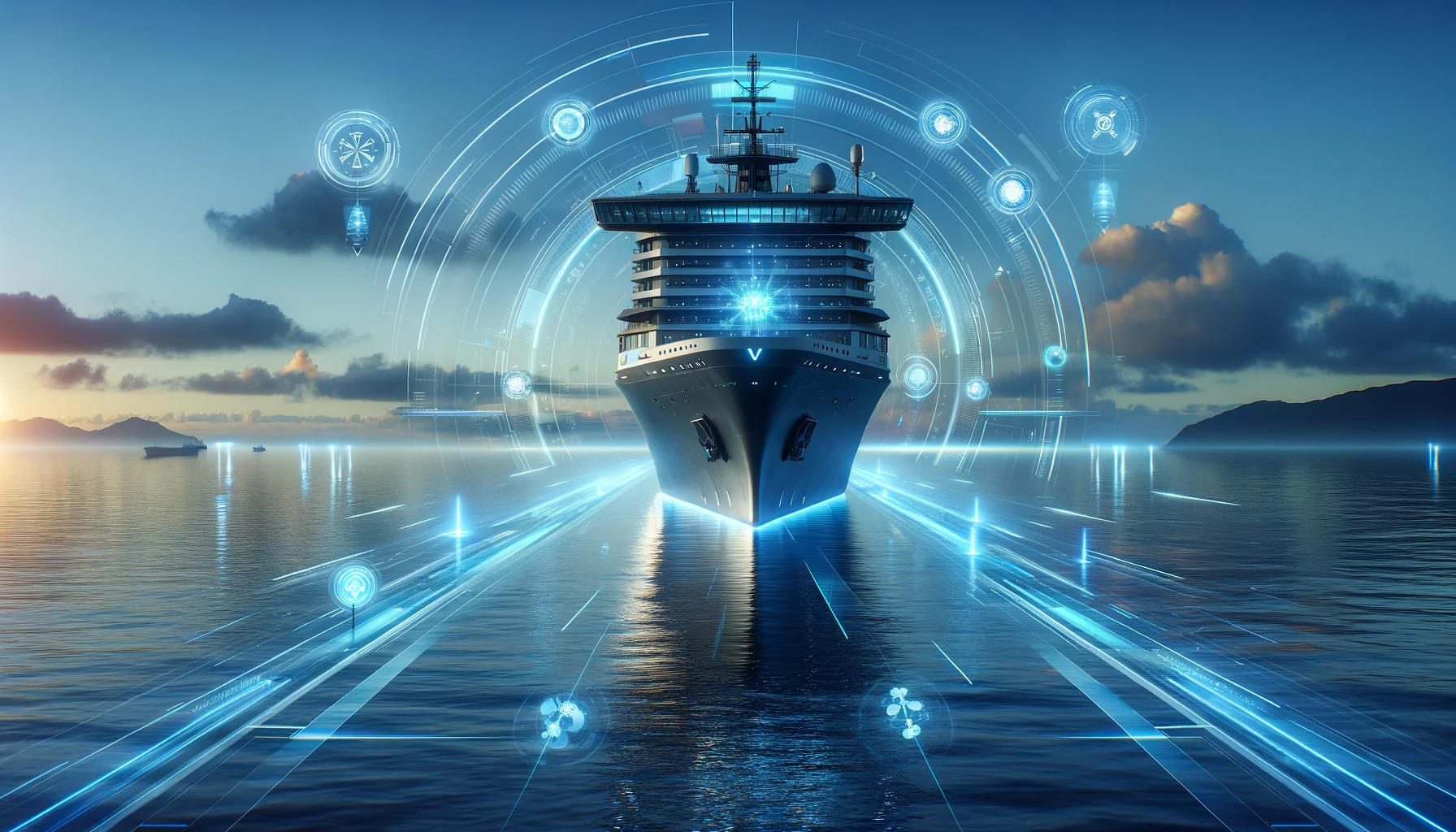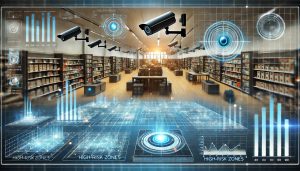Just as GPS revolutionised road travel by making it almost impossible to get lost on a long car journey, AI is poised to transform maritime navigation.
Integrating AI into ship operations is like having a highly experienced co-captain who never sleeps, never gets tired, and can predict changes in weather patterns, ocean currents, and potential hazards with incredible accuracy.
This isn’t about replacing the human touch or the seasoned intuition of a captain, but rather augmenting it with a powerful tool that can process vast amounts of data in real-time, ensuring safer and more efficient voyages. So, let’s embark on a journey to discover how AI is guiding the future of maritime travel, promising smoother sailings and a new horizon in shipping efficiency and safety.
How AI Is Revolutionising Maritime Navigation
- AI: The Modern Mariner’s Compass
Just as the mariner’s compass was once a groundbreaking innovation that opened the seas to exploration, AI is now the beacon guiding ships through modern challenges. AI technologies utilise a combination of sensors, data analytics, and predictive algorithms to make real-time decisions that can optimise routes, reduce fuel consumption, and enhance safety.
- Enhancing Navigation and Safety
One of the primary applications of AI in shipping is in navigation systems. AI-driven systems analyse historical data and real-time inputs from the ship’s sensors and external sources like weather reports and satellite images. This allows for dynamic route optimisation that can adjust to changing conditions, much like a navigation app in your car that reroutes you away from traffic jams.
“AI in shipping is not just about getting from point A to point B. It’s about understanding the sea, just as a seasoned sailor would, but with the computational power to process thousands of data points per second,” explains Dr. Linda Carter, an expert in maritime technology.
- Improving Efficiency and Reducing Environmental Impact
AI also plays a crucial role in improving the efficiency of ships, which is particularly important in an industry under pressure to reduce environmental impacts. By optimising travel routes and speeds, AI helps in significantly lowering fuel consumption. This not only cuts costs but also reduces the ship’s carbon footprint, helping the maritime industry move towards more sustainable practices.
Fact: Ships transport about 90% of the world’s trade, and optimising their routes and fuel usage can lead to significant reductions in global carbon emissions.
The Technical Sail: Implementing AI on Modern Vessels
- Navigating Complex Waters With AI
The implementation of AI on ships involves a sophisticated array of sensors and data-processing systems that collect and analyse information from the ship’s environment.
This setup includes radar for detecting other vessels, sonar for underwater obstacles, and GPS systems for precise positioning. AI synthesises this data to create a comprehensive situational awareness that assists in decision-making.
- AI-powered Predictive Maintenance
Another critical application of AI in maritime operations is predictive maintenance. AI systems monitor the condition of the ship’s equipment, using sensors to detect anomalies that could predict failures before they occur.
“Predictive maintenance transforms ship management from a reactive to a proactive stance, significantly reducing the risk of unscheduled downtimes,” says Michael Thomson, Marine Engineer.
- Enhanced Communication Systems
AI also improves communication systems onboard. By integrating AI with satellite communications, ships can maintain constant contact with port authorities and other ships. This integration facilitates smoother operations, especially on congested sea routes or during emergencies.
Real-world Applications: AI at Sea
- Case Study: Autonomous Vessels
One of the most exciting developments in maritime AI is the advent of autonomous or unmanned ships. These vessels, guided entirely by AI without a crew on board, are currently being tested in several regions.
For example, the Yara Birkeland, launched by Norway, is the world’s first fully electric and autonomous container ship. It navigates using a combination of GPS, radar, cameras, and LiDAR.
- AI for Emergency Response
AI systems are not just for daily operations but also play a crucial role in emergency response. AI-driven drones can survey an area after a spill or accident, providing real-time data to guide cleanup operations and assess damage more efficiently than human crews.
The Horizon Ahead: Challenges and Future Prospects
While AI promises to streamline operations and enhance safety, several challenges need addressing:
- Navigating Regulatory Waters
The introduction of AI in shipping raises complex regulatory questions. International maritime organisations are currently working to establish guidelines that accommodate these new technologies while ensuring safety and compliance.
- Human Element
“As we integrate more AI into maritime operations, the role of the human on the bridge does not diminish but evolves,” notes Captain Sarah Zhou, a maritime academy instructor.
There’s also the challenge of integrating the human element with AI. Training for crew members not only involves operating the technology but also troubleshooting and intervening when necessary.
- Looking Forward
The future of maritime navigation with AI looks promising, with continuous advancements in technology paving the way for more autonomous ships and even smarter navigation solutions. The goal is not only to make shipping more efficient but also safer and more environmentally friendly.
Broader Implications: AI’s Impact on Global Shipping
The integration of AI into maritime operations isn’t just a technological upgrade; it’s a transformative shift that has broad implications for global trade, safety, and environmental sustainability.
- Global Trade Efficiency
AI-enhanced ships can navigate more quickly and safely between ports, reducing turnaround times and increasing the volume of goods that can be transported. This efficiency boost is crucial for global trade, as it enhances supply chain reliability and speed, factors that are increasingly vital in our interconnected world.
- Enhanced Safety Measures
With AI’s capability to predict and mitigate potential hazards at sea, the risk of maritime accidents decreases significantly. AI systems can detect issues such as equipment failure or potential collisions long before they become apparent to human senses, thereby providing crews with crucial reaction time.
- Environmental Sustainability
“AI is setting the course towards a more efficient, safe, and sustainable future in maritime transport. The implications for global trade and environmental conservation are profound,” asserts Dr. Emily Tran, an environmental researcher specialising in maritime studies.
AI also contributes to environmental sustainability by optimising routes to reduce fuel consumption, thereby lowering emissions. As maritime transport is a major contributor to global CO2 emissions, these improvements are vital for meeting international environmental standards and goals.
Looking to the Horizon: The Future of AI in Shipping
As we chart the course forward, the potential for AI in maritime navigation continues to expand. Future developments could include:
- Fully Autonomous Fleets
Technology is paving the way for entirely autonomous fleets, where AI not only navigates ships but also manages logistics and dock operations. These developments could revolutionise the shipping industry by reducing labour costs and further increasing efficiency.
- Integrated Global Systems
Imagine a world where AI systems on ships communicate seamlessly with automated ports and logistics networks, creating a fully integrated global transport system. This could significantly reduce delays and inefficiencies, transforming how goods are moved around the world.
- Enhanced Data Analytics
As AI technology advances, the ability to process and analyse data will only improve. This means more precise predictions and optimisations, further enhancing the capabilities and safety of maritime operations.
Conclusion
As we sail into the future, AI stands as a beacon of innovation in maritime navigation. From enhancing safety to optimising operational efficiency and promoting environmental sustainability, AI’s role in maritime operations is not just beneficial but transformative. The journey of integrating AI into maritime practices is ongoing and filled with opportunities. By embracing these advanced technologies, the maritime industry can navigate towards a more efficient and sustainable future.
- Engage With BlueSky Creations
At BlueSky Creations, we are at the forefront of integrating innovative solutions like AI into various industries, including maritime. We understand the complexities and the immense potential of AI to transform not just individual companies but entire sectors. Whether you’re looking to optimise your operations or explore the possibilities of AI in your business, BlueSky Creations is here to guide and support your journey.
Discover more about how we can help you navigate the future of your industry. Visit us at BlueSky Creations and let’s chart a course towards innovation and efficiency together.
FAQs
- How Does AI Improve Safety in Maritime Navigation?
AI enhances safety by utilising advanced sensors and data analytics to predict and mitigate potential hazards such as collisions, equipment failures, and adverse weather conditions. By providing real-time updates and recommendations, AI helps crews make informed decisions quickly, significantly reducing the risk of accidents.
- Can AI Completely Replace Human Crews on Ships?
While AI can automate many aspects of navigation and ship management, a complete replacement of human crews is not currently feasible. Human oversight is crucial for handling unexpected situations and ethical considerations. AI is intended to augment human capabilities, not replace them, ensuring that ships are safer and more efficient but still under human guidance.
- What are the Environmental Benefits of Using AI in Shipping?
AI contributes to environmental sustainability by optimising ship routes and speeds to reduce fuel consumption, thereby lowering emissions. Additionally, AI can manage the efficient use of resources on board, contribute to better waste management, and help in adhering to environmental regulations more effectively.
- What Challenges Are Associated With Implementing AI in Maritime Navigation?
Challenges include the high cost of technology integration, the need for significant data to train AI systems, resistance to change from within the industry, and regulatory hurdles that need to be navigated as the technology evolves. Additionally, there are concerns about data privacy and cybersecurity that must be addressed.
- How is AI in Maritime Navigation Expected to Evolve in the Next Decade?
AI is expected to advance towards greater autonomy in maritime operations, including more widespread use of autonomous ships and integration with global supply chains. Developments in machine learning and data processing will enhance predictive capabilities, making AI more adaptive and insightful. The industry will likely see an increase in regulatory frameworks designed to support the safe integration of AI technologies.
- How Can I Learn More About AI Applications in My Industry?
BlueSky Creations offers consulting and development services tailored to various industries, including maritime. By partnering with us, you can explore specific AI applications suited to your operational needs and strategic goals. Visit our website to learn more about how we can help you integrate AI into your business processes.







No comment yet, add your voice below!